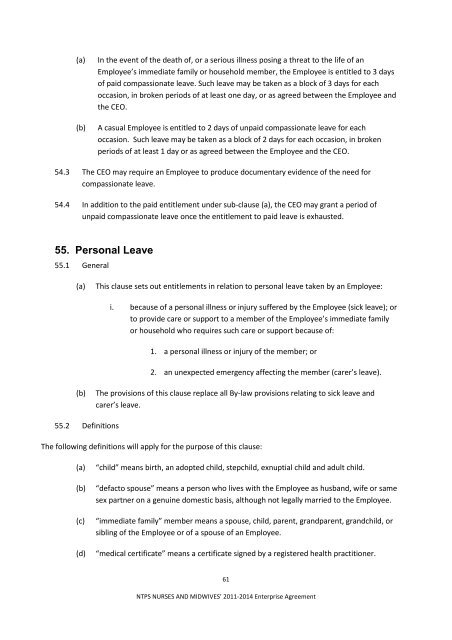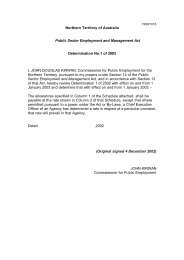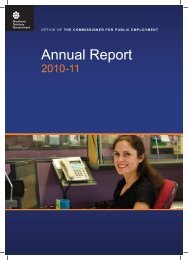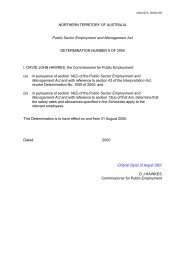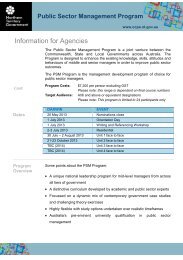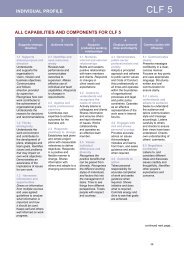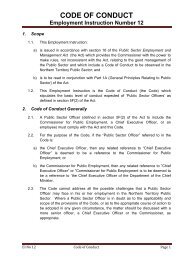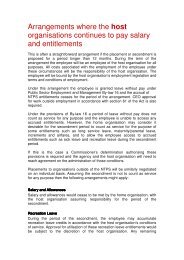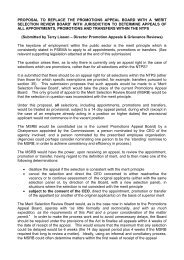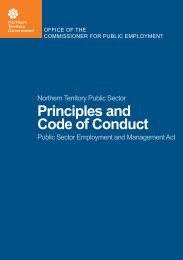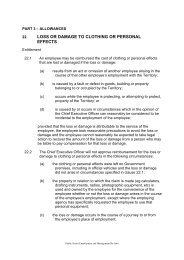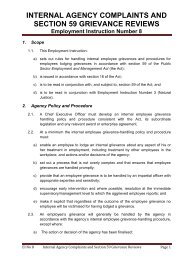northern territory public sector nurses and midwives - Office of the ...
northern territory public sector nurses and midwives - Office of the ...
northern territory public sector nurses and midwives - Office of the ...
You also want an ePaper? Increase the reach of your titles
YUMPU automatically turns print PDFs into web optimized ePapers that Google loves.
(a)<br />
(b)<br />
In <strong>the</strong> event <strong>of</strong> <strong>the</strong> death <strong>of</strong>, or a serious illness posing a threat to <strong>the</strong> life <strong>of</strong> an<br />
Employee’s immediate family or household member, <strong>the</strong> Employee is entitled to 3 days<br />
<strong>of</strong> paid compassionate leave. Such leave may be taken as a block <strong>of</strong> 3 days for each<br />
occasion, in broken periods <strong>of</strong> at least one day, or as agreed between <strong>the</strong> Employee <strong>and</strong><br />
<strong>the</strong> CEO.<br />
A casual Employee is entitled to 2 days <strong>of</strong> unpaid compassionate leave for each<br />
occasion. Such leave may be taken as a block <strong>of</strong> 2 days for each occasion, in broken<br />
periods <strong>of</strong> at least 1 day or as agreed between <strong>the</strong> Employee <strong>and</strong> <strong>the</strong> CEO.<br />
54.3 The CEO may require an Employee to produce documentary evidence <strong>of</strong> <strong>the</strong> need for<br />
compassionate leave.<br />
54.4 In addition to <strong>the</strong> paid entitlement under sub-clause (a), <strong>the</strong> CEO may grant a period <strong>of</strong><br />
unpaid compassionate leave once <strong>the</strong> entitlement to paid leave is exhausted.<br />
55. Personal Leave<br />
55.1 General<br />
(a)<br />
This clause sets out entitlements in relation to personal leave taken by an Employee:<br />
i. because <strong>of</strong> a personal illness or injury suffered by <strong>the</strong> Employee (sick leave); or<br />
to provide care or support to a member <strong>of</strong> <strong>the</strong> Employee’s immediate family<br />
or household who requires such care or support because <strong>of</strong>:<br />
1. a personal illness or injury <strong>of</strong> <strong>the</strong> member; or<br />
2. an unexpected emergency affecting <strong>the</strong> member (carer’s leave).<br />
(b)<br />
The provisions <strong>of</strong> this clause replace all By-law provisions relating to sick leave <strong>and</strong><br />
carer’s leave.<br />
55.2 Definitions<br />
The following definitions will apply for <strong>the</strong> purpose <strong>of</strong> this clause:<br />
(a)<br />
(b)<br />
(c)<br />
(d)<br />
“child” means birth, an adopted child, stepchild, exnuptial child <strong>and</strong> adult child.<br />
“defacto spouse” means a person who lives with <strong>the</strong> Employee as husb<strong>and</strong>, wife or same<br />
sex partner on a genuine domestic basis, although not legally married to <strong>the</strong> Employee.<br />
“immediate family” member means a spouse, child, parent, gr<strong>and</strong>parent, gr<strong>and</strong>child, or<br />
sibling <strong>of</strong> <strong>the</strong> Employee or <strong>of</strong> a spouse <strong>of</strong> an Employee.<br />
“medical certificate” means a certificate signed by a registered health practitioner.<br />
61<br />
NTPS NURSES AND MIDWIVES’ 2011-2014 Enterprise Agreement


